Evaluating Country Programmes - OECD Online Bookshop
Evaluating Country Programmes - OECD Online Bookshop
Evaluating Country Programmes - OECD Online Bookshop
Create successful ePaper yourself
Turn your PDF publications into a flip-book with our unique Google optimized e-Paper software.
<strong>OECD</strong> 1999<br />
<strong>Country</strong> Assistance Evaluation: Case Study of the OED Philippines<br />
– Search for implementation strengths and weaknesses.<br />
– Identify important omissions at all three stages (diagnosis, formulation of<br />
objectives, implementation steps).<br />
– Draw country-specific and general lessons.<br />
The focus of the CAR was on the issues which were still relevant at the time of<br />
the evaluation for decision-making by the Government and by the Bank. In fact,<br />
once the East Asian crisis erupted in July 1997 following our June field visit, we felt<br />
compelled to deepen our evaluation of Bank assistance to the financial sector and<br />
to cover issues related to crisis prevention and resolution. The starting point of the<br />
evaluation was 1986, because it was a turning point in both the political landscape<br />
and in the economic and social policy stance of the Philippines. We attempted to<br />
evaluate the challenges, needs and assistance outcomes in all important sectors, so<br />
as to provide a solid basis for a summary judgement on the Bank performance and<br />
pass a balanced judgement on relative assistance priorities for the past and for the<br />
future. This is not, however, a fixed or required feature of our country evaluations.<br />
Most of our recent CANs (and some of our CARs), faced with tighter budgetary ceilings,<br />
had to choose to be more selective in their coverage to assure adequate<br />
depth of analysis.<br />
CAR team composition<br />
A fairly large team was assembled under the co-ordination of a task manager (a<br />
senior economist and OED evaluator) who was also responsible for macro and private<br />
sector development. The author of this note, another senior economist and<br />
OED evaluator, was charged with assessing Bank assistance for public sector management,<br />
but was later given the full responsibilities of the task manager after his<br />
redeployment immediately following the June mission. A senior social scientist on<br />
secondment from an evaluation unit of the Norwegian Government provided a contribution<br />
on poverty; another senior economist on secondment from the evaluation<br />
department of the Asian Development Bank covered agriculture and natural<br />
resource management; a junior Bank consultant on social development explored<br />
issues related to aid co-ordination, NGO participation, and gender equality; and<br />
another Bank consultant provided a contribution on portfolio management, and<br />
general research and statistical assistance. Desk contributions were commissioned<br />
from consultants with varying degrees of Bank experience in the areas of financial<br />
sector, quality at entry of the portfolio, water supply and sanitation, transport,<br />
energy, health and education, environment and decentralisation. International<br />
Finance Co-operation (IFC) and Multilateral Investment Guarantee Agency (MIGA)<br />
provided two descriptive boxes on their assistance. Among the peer reviewers, in<br />
addition to OED staff familiar with the Philippines, we enlisted the head of the main<br />
economic policy research institute in the country.<br />
209



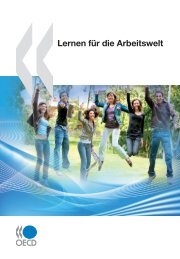

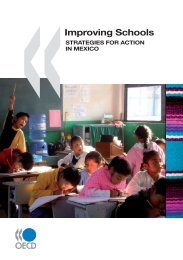
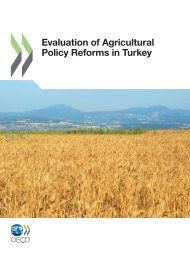
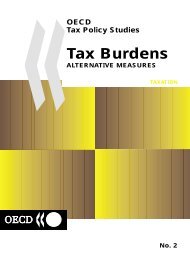
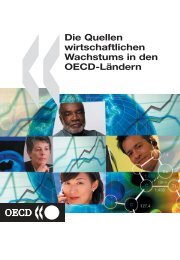
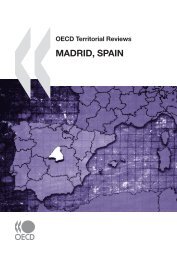


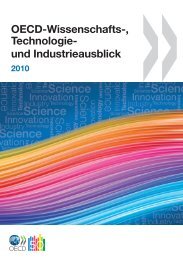
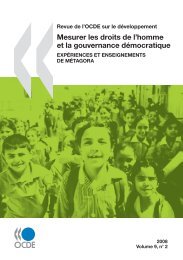
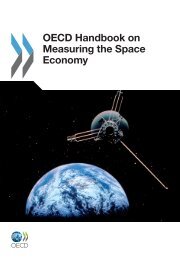
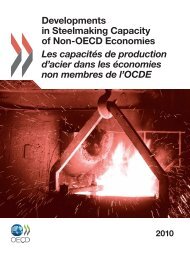
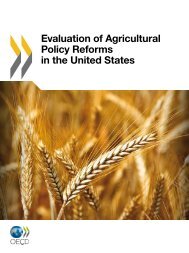
![CQE=U]^\]Z: KAZAKHSTAN - OECD Online Bookshop](https://img.yumpu.com/3915768/1/190x253/cqeuz-kazakhstan-oecd-online-bookshop.jpg?quality=85)